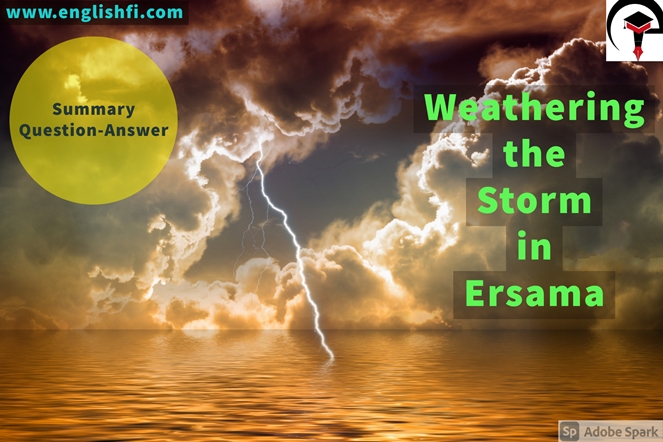CBSE|UP BOARD|ENGLISH SOLUTION|ENGLISH LITERATURE|CLASS 9th
Hello, Dear readers,
You, Exactly landed on right Place.
Today, I will be discussing all the important points related to ‘Weathering the Storm in Ersama by Harsh Mander’. I ensure you will get a complete idea to write the Summary and Question-Answer of the lesson orderly. After reading this page you will find the secret to score outstanding marks in the board examination.
Let’s get started
Summary
Prashant, a young boy of nineteen years, who belonged to Kalikuda, a village in the coastal state of Odisha, had lost his mother seven years ago.
On a day when he was visiting a friend in Ersama, a village around 18 km away from his paternal village, a super cyclone hit the area. A large-scale destruction made them stuck to the roofs only, and fortunately, a coconut tree banged on the house of the narrator’s friend, thus solving their problem of starvation.
The gushy winds and rains continued for two days, and so they had to spend the time on the rooftop of the house. As soon as the rain stopped, Prashant left for his maternal village along with a stick to help him determine his path.
At times, he had to swim through the floodwaters; and as soon as he joined his uncle’s friends and reached his village, he also had to witness the cruelty of the nature in form of dead bodies of men, women, children, and even animals too.
As they crossed villages, not even a single house could be seen. Prashant’s house was damaged too and he saw the belongings hanging on the branches of the trees. All this shattered his hope of his family’s survival.
As a last ray of hope, he went to the Red Cross shelter, where he first met his maternal grandmother who was very elated to see him alive as they had lost the hope that he would have survived the storm.
There at the shelter, Prashant saw a crowd of 2500 people at the shelter, and many of them had lost their families in the disaster. For the last 2 days, they had survived on coconuts but they were running out of stock.
So, Prashant formed a group with some elders and young people and forced the merchant to give them the stock of rice. Fortunately, they succeeded, and after 4 days the crowd ate a full meal.
Then he formed another group of volunteers who cleaned the shelter and tended to the injured people. Prashant enrolled the widows to work in the NGO named “ Food for work ”; and also engaged the children by arranging sports matches for them.
The volunteers managed to set up foster families comprising of the widows, orphaned children, and lone men who would form a family and support each other. All this helped Prashant to overcome his grief of losing his mother, and to smile even in the face of adversities.
Question-Answer: Weathering the Storm in Ersama
1. What havoc has the super cyclone wrecked in the life of the people of Orissa?
Ans: The super cyclone led to mass destruction. People lost their family, homes, and their lives too. Many women became widows, many children became orphans, top of that, many lost their basis for survival, i.e., their farms and dairy animals too.
2. How has Prashant, a teenager, been able to help the people of his village?
Ans: Prashant helped the people in the following ways –
- He formed a group of volunteers and got rice for the people.
- They cleaned the shelter and tended to the injured.
- They sent messages to the passing helicopters demanding food and other necessities.
- Prashant guided the widows to work in the NGO named “ food for work “.
- He arranged sports events for the orphan children.
- Prashant and the volunteers set up foster families for them.
3. How have the people of the community helped one another? What role do the women of Kalikuda play during these days?
Ans: Under the leadership of Prashant, the people of the community went to the local merchant and got his stock of rice. Thereafter, they cooked the rice on a fire burned with the branches from the trees and ate a full meal after four long days.
They signaled the military helicopters for food and help by lying down on the ground and putting a utensil over their stomach. The widowed women looked after the orphaned children and the men arranged food and other necessities.
4. Why do Prashant and other volunteers resist the plan to set up institutions for orphans and widows? What alternatives do they consider?
Ans: Prashant and other volunteers resisted the plan to set up institutions for orphans and widows because they felt that isolation would increase their grief. They wanted to settle them in foster families of their own community where they would love and support each other.
5. Do you think Prashant is a good leader? Do you think young people can get together to help people during natural calamities?
Ans: Yes, Prashant is a good leader. He overcame his grief and took charge of the situation. Yes, young people can get together to help others during any calamity. They can use their strength and energy to help others in times of need.
Content Writer- Vaishnavi Tripathi…… Edited by- Shadab Akhtar.

